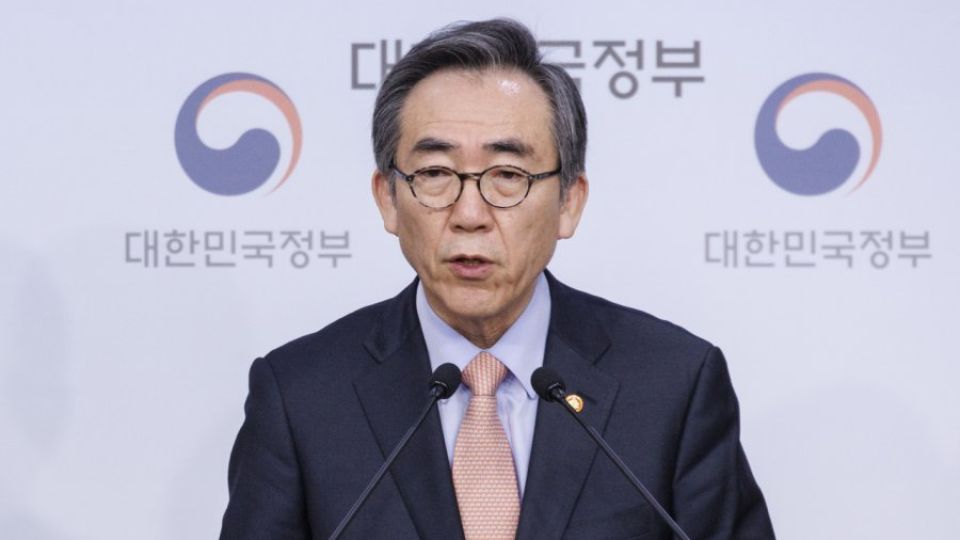March 8, 2024
SEOUL – South Korea’s Foreign Ministry on Thursday unveiled plans to restructure the office responsible for negotiations on North Korean nuclear issues and the establishment of a peace regime on the Korean Peninsula, amid escalating North Korean nuclear threats and a prolonged absence of nuclear talks.
The Foreign Ministry announced its decision to rebrand the Office of Korean Peninsula Peace and Security Affairs, tentatively renaming it the Office of Diplomatic Strategy and Intelligence in Korean.
The ministry will essentially and symbolically disband the existing bureau dedicated to building a peace regime on the peninsula, with its functions incorporated into a new bureau under the new office.
The ministry will also integrate new functions for intelligence collection and strategic planning within the new office, aiming to address North Korean issues from a broader perspective.
This announcement was a crucial component of Foreign Minister Cho Tae-yul’s briefing on this year’s ministry plan to President Yoon Suk Yeol.
The Office of Korean Peninsula Peace and Security Affairs was initially established as an ad hoc organization in 2006 to facilitate six-party talks aimed at finding a peaceful resolution to North Korea’s nuclear program through multilateral diplomatic negotiations. However, in 2011, amidst North Korea’s continued development of its nuclear program, it transformed into a permanent organization.
Currently, the office consists of two bureaus and four divisions: the North Korean Nuclear Affairs Bureau, which houses the North Korean Nuclear Affairs Negotiations Division and the North Korean Nuclear Affairs Policy Division as well as the Korean Peninsula Peace Regime Bureau, which encompasses the Korean Peninsula Peace Regime Division and the Inter-Korean Policy Division.
The ministry will operate three divisions with potential changes to their current names and under one bureau, tentatively named the “Bureau for Korean Peninsula Diplomacy.”
A senior Foreign Ministry official said the ministry plans to name three divisions, reflecting the “absence of negotiations for a peace regime” and the diverse roles it plays concerning North Korean defectors and human rights issues, during a closed-door briefing in February on condition of anonymity and under a publication embargo.
However, the Office of Diplomatic Strategy and Intelligence will undertake expanded responsibilities across four key areas: formulating diplomatic strategy, gathering information and intelligence, managing Korean Peninsula affairs, and overseeing international security and cybersecurity.
Essentially, within the upcoming office, there will be four bureaus dedicated to the areas.
The Foreign Ministry has underscored the inevitability of restructuring the office, citing the evolving nature of North Korean nuclear and missile threats. This highlights the increasing need to address the issue from a broader perspective.
“Over the past decade, the North Korean nuclear issue has diversified beyond just North Korea’s nuclear missile threats to encompass cybercrimes for fundraising, prompting the need for responses such as financial sanctions,” the unnamed official said.
“Therefore, our objective is to approach Korean Peninsula issues within a broader framework by integrating the functions of strategic planning, intelligence gathering and global security into our management of Korean Peninsula affairs.”
The role of a special representative for Korean Peninsula peace and security affairs, acting as the chief nuclear envoy, will be transitioned to the head of the new Office of Diplomatic Strategy and Intelligence.
The restructuring, furthermore, aligns with South Korea’s ambition to become a “global pivotal state.”
“Moreover, the development of a strategic vision and precise positioning is becoming increasingly crucial in navigating through complex global crises,” the official added.
The Foreign Ministry will also establish a new division dedicated to handling economic security diplomacy within the Bilateral Economic Affairs Bureau.
The official said that the decision stems from the recognition that “economic security has been becoming as crucial as traditional security.”
Additionally, the five Central Asian countries, which are currently overseen by the European Affairs Bureau, will fall under the jurisdiction of the Northeast Asian Affairs Bureau.
The official explained that this reform aims to “enhance the regional linkage and operational efficiency” concerning Central Asian countries, which “possess abundant resources and are gaining significance as new emerging markets.”
The Foreign Ministry aims to proceed with the reshuffle in the first half of this year.


